How cells become cancerous is a process researchers are still trying to fully understand. Generally, normal cells grow and multiply through controlled cell division, where old and damaged cells are replaced after they die by new cells. Sometimes this process stops working, leading cells to start growing uncontrollably and develop into a tumor.
Traditionally, cancer treatments like chemotherapy, immunotherapy, radiation and surgery focus on killing cancer cells. Another type of treatment using stem cells called differentiation therapy, however, focuses on persuading cancer cells to become normal cells.
We are researchers who study how stem cells, or immature cells that can develop into different types of cells, behave in states of health and disease. We believe that stem cells can provide potential treatments for cancer of all types in many different ways.
How do stem cells contribute to cancer?
Stem cells are unspecialized cells, meaning they can eventually become any one of the various types of cells that make up different parts of the body. They can replenish cells in the skin, bone, blood and other organs during development, and regenerate and repair tissues when they’re damaged.
There are different types of stem cells. Embryonic stem cells are the first cells that initially form after a sperm fertilizes an egg, and can give rise to all other cell types in the human body. Adult stem cells are more mature, meaning they can replace damaged cells only in one type of organ and have a limited ability to multiply. Researchers can reprogram adult stem cells, or differentiated cells, in the lab to act like embryonic stem cells.
Cells become specialized over the course of development.
Because stem cells can survive longer than regular cells, they have a much higher probability of accumulating genetic mutations that can result in loss of control over their growth and ability to regenerate. This is why many tumors harbor a small subpopulation of cells that function like stem cells. These so-called cancer stem cells are thought to be responsible at least in part for cancer initiation, progression, metastasis, recurrence and treatment resistance.
What is differentiation therapy?
Accumulating evidence is also showing that cancer stem cells can differentiate into multiple cell types, including noncancerous cells. Researchers are taking advantage of this fact through a type of treatment called differentiation therapy.
The concept of differentiation therapy originated from scientists observing that hormones and cytokines, which are proteins that play a key role in cell communication, can stimulate stem cells to mature and lose their ability to regenerate. It followed that forcing cancer stem cells to differentiate into more mature cells could subsequently stop them from multiplying uncontrollably, making them become normal cells.
Differentiation therapy has been…
